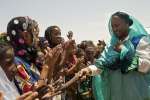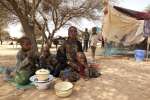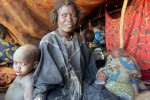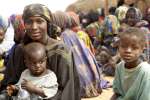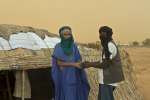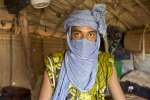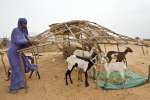- Text size
 |
|  |
|  |
| 
- Français
Malian refugees vote in second round of presidential elections
News Stories, 12 August 2013
Dakar, Senegal, August 12 (UNHCR) – Thousands of Malian refugees voted in exile in the second round of the presidential election taking place in their home country in hopes of an imminent return to peace and stability.
While overall voter turnout in Mali decreased since the first round, the number of refugees participating in Sunday's election's run off dramatically increased thanks to the additional distribution of biometric ID cards, called NINA cards, to refugees in neighboring countries, namely Mauritania.
In the run-up to the second round, an additional 2,084 NINA cards were flown in by UN peacekeeping force MINUSMA from Timbuktu in the north of Mali to Mauritania to allow Malian refugees to vote. A total of 3,110 refugees in the country cast their vote, against a mere 811 in the first round of elections thanks to the special delivery of the NINA cards.
In Burkina Faso, 45-year-old Malian refugee Ibrahim Ag Moussa, determined to vote, boarded a bus provided by the Malian embassy to travel to the polling station where he was registered.
"It feels really good to vote," Moussa says. "In some ways, it gives me hope that peace is near." Moussa was one of 133 Malian refugees in Burkina to vote, a figure that increased from 88 voters in the first round.
Like many refugees, Moussa believed elections might signal an opportunity to return home to peace soon. "If all goes well, I want to be back in Mali before the end of the year," he added.
In neighboring Niger, 862 refugees living in four different camps voted, up from 323 voters in the first round.
In total, some 4,000 refugees across the region participated in the election. In comparison, 1,313 refugees voted in the first round. Elections are considered crucial by refugees and internally displaced persons for the stability of the country as well as to potentially allow a return to their areas of origin.
"The presidential elections will allow Mali to get out of the transitional period and to focus on the development of the country," said 26-year-old Mohamed, who voted on Sunday in Timbuktu after spending months with his family as refugees in Mauritania.
Mohamed walked from his village of Teshek, seven kilometres from Timbuktu, to cast his vote. He collected his NINA card in Timbuktu in early July after authorities personally called to let him know it was available. A Tuareg, Mohamed left his village in April 2012 following the arrival of jihadist groups in the Timbuktu region.
"I left with 15 members of my family, we traveled on camels' backs to Mauritania as we did not feel safe staying in Mali." They returned from Mbera camp, Mauritania, to their village near Timbuktu in February 2013, following the military intervention by the French and African troops in the north of the country. "We have not had any problems since we have returned, people know each other and know who did what or not. We just want peace".
Many refugees from Tuareg and Arab ethnicities in neighboring countries are still, however, cautious about returning to Mali for fear of reprisals from other communities or the Malian Army. Although returns of refugees from camps in Burkina Faso, Mauritania and Niger still remain timid, movements back to Mali could happen very quickly.
"It all depends on the stability and security that are hoped to be generated by the new president," says Baya who returned to Timbuktu from Mbera camp in Mauritania a month ago. Baya heard on the news and from friends who had remained in Mali that the north was now safer and decided to return to his hometown to take care of his business.
"I will wait to see how things evolve after the elections whether to decide to bring back my wife and our 11 children from Mauritania." Baya, who belongs to the Arab community of Timbuktu, praises his Songhai neighbours who took care of his shop after he left Timbuktu following the French and African armies' intervention last January. He said less than 100 Arabs have returned to Timbuktu.
In total, some seven million Malians were eligible to vote in both rounds of elections, the first since conflict erupted in Mali in January last year between government forces and various rebel groups, which instigated military intervention from France.
While no security incidents were reported at polling stations, heavy rains deterred Malians from casting their vote, and many refugees in neighboring countries faced administrative obstacles preventing them from participating. As in the first round of elections, refugees needed to have a NINA card and be on the electoral lists.
"Today I came so close to exercising my right as a citizen, but I found out at the last minute this would not be possible," says Youssouf Ag Mohammed, a Malian refugee from Timbuktu currently in Burkina Faso. Initially, Youssouf was elated to find his name on the electoral list but unable to get his NINA card from Timbuktu before Sunday, Youssouf became discouraged.
"As the day of the elections grew nearer and I saw that I wouldn't be able to get my card, I became increasingly frustrated." Youssouf said he had wanted to vote in order to feel that he played a role in the peace process and reconstruction of his country.
UNHCR's role in the elections was strictly humanitarian and non-political. The agency informed refugees about the electoral process, facilitated their participation and helped ensure the voluntary nature of the electoral process in a safe environment.
By Hélène Caux in Timbuktu, Mali and Kathryn Mahoney in Dakar, Senegal. Amaria Belaskri in Niger and Hugo Reichenberger in Burkina Faso contributed to this article.

